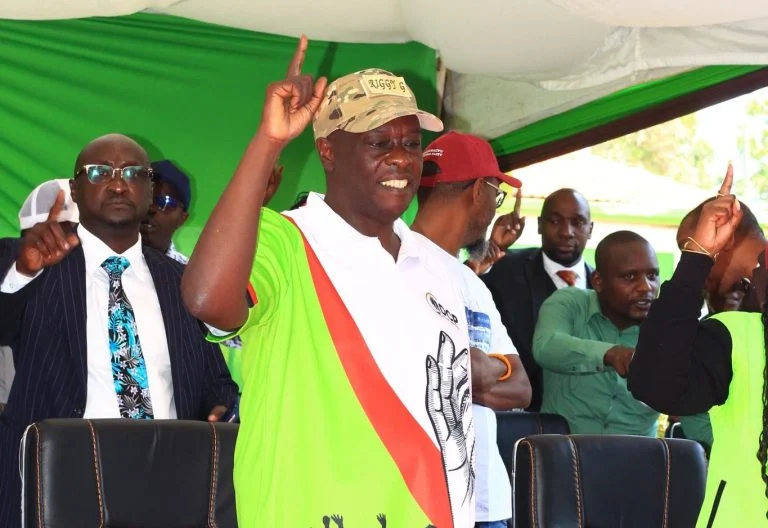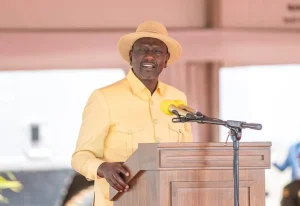Opinion
Wantam, Kasongo Slogans Will Not Make United Opposition Win In 2027 As Proven in the By Elections: Change or Perish
They were busy creating TikTok-ready moments while their opponents were doing the unglamorous work of coalition building and voter mobilization.

Thursday’s by-election results have delivered a cold, unsparing verdict on Kenya’s United Opposition: catchy slogans are no substitute for coherent policy, and mockery is not a political strategy.
The broad-based government swept all seven parliamentary seats, leaving Rigathi Gachagua, Kalonzo Musyoka, Eugene Wamalwa and their allies nursing wounds that should have been entirely predictable.
When your entire political arsenal consists of nicknaming your opponent “Kasongo” and chanting “Wantam” at rallies, you shouldn’t be surprised when voters hand you a humiliating defeat.
The numbers tell a brutal story.
In Malava, where the opposition threw everything including the kitchen sink, UDA’s David Ndakwa won with 21,564 votes against DAP-K’s Seth Panyako’s 20,210.
In Mbeere North, Gachagua’s personal battleground where he went door to door trying to prove he still commands Mount Kenya, Leonard Muriuki wa Muthende scraped through with 15,802 votes against Newton Kariuki’s 15,308.
Even in ODM strongholds like Magarini, Kasipul and Ugunja, the party’s dominance only underscored how thoroughly the opposition has been boxed into irrelevance outside their ethnic enclaves.
Let’s be clear about what happened here.
This wasn’t a close call where a few more rallies or better ground organization might have tipped the scales.
This was a referendum on substance versus noise, and noise lost decisively.
The United Opposition spent months perfecting their insult repertoire while President Ruto was busy forming a broad-based government that neutralized ODM as an opposition force.
They were busy creating TikTok-ready moments while their opponents were doing the unglamorous work of coalition building and voter mobilization.
The Malava race perfectly encapsulates the opposition’s delusion.
Here was a seat they considered winnable, backed by heavyweights like Eugene Wamalwa on home turf.
They had momentum, they had crowds, they had social media buzz.
What they didn’t have was a compelling reason for voters to choose them beyond “Ruto is bad.” In 2025, with Kenyans grappling with the cost of living, unemployment, and a healthcare system in crisis, telling them that the president reminds you of a Congolese musician is not exactly policy gold.
Gachagua’s humiliation in Mbeere North deserves special attention.
The former deputy president has spent the better part of this year positioning himself as the kingmaker of Mount Kenya, the region’s authentic voice against Ruto’s alleged betrayal.
He campaigned as if his political life depended on it, which frankly it did.
And he lost. Not by a landslide, granted, but in politics, losing your own backyard by even a single vote is a loss that echoes.
If Gachagua cannot deliver a constituency where he personally knocked on doors and made the contest a personal plebiscite on his influence, what exactly is his value proposition to other opposition leaders looking for a 2027 standard bearer?
The opposition’s strategic bankruptcy runs deeper than poor candidate selection or weak ground games. It reflects a fundamental misunderstanding of the Kenyan voter in 2025.
This is not 2007 or 2017 when ethnic mobilization and anti-government sentiment alone could deliver victories. Ruto has shrewdly blunted that approach by co-opting ODM, historically the most formidable opposition outfit.
The broad-based government has created a political traffic jam where the opposition’s traditional routes to power are blocked.
Yet instead of finding new roads, the opposition is standing at the roadblock honking angrily and hoping someone will move.
“Kasongo” was supposed to diminish Ruto by portraying him as foreign, as somehow not authentically Kenyan.
It’s a dog whistle that has failed spectacularly because voters have moved past ethnic dog whistles in favor of what matters to them: jobs, security, healthcare, education.
Meanwhile, “Wantam” – a juvenile attempt at painting the government as thieves, Ruto as a one term president – sounds increasingly hollow when your alternative platform is… what exactly? The opposition has spent so much time defining what they’re against that they’ve forgotten to articulate what they’re for.
Compare this to 2002 when Mwai Kibaki’s NARC coalition swept to power not just on anti-Moi sentiment but on a concrete platform promising free primary education, anti-corruption drives and constitutional reform.
Or 2013 when Uhuru Kenyatta and William Ruto sold Jubilee with specific infrastructure promises.
Even Raila Odinga’s most successful campaigns combined charisma with policy specifics, from devolution advocacy to economic blueprints. What does the United Opposition offer? Slogans that would struggle to win a high school debate.
The violence and chaos that marred several polling stations should also shame the opposition into reflection.
When your supporters are disrupting vote counting because you’ve conditioned them to believe that any loss must be rigged, you’re not building a democratic movement.
You’re building a mob.
The scenes in Malava where opposition supporters attempted to storm counting centers, the allegations of voter intimidation in Mbeere North, these are not signs of a movement confident in its ideas.
They’re the death throes of a political coalition that knows it’s losing and would rather burn the house down than accept defeat gracefully.
Perhaps most damning is how thoroughly the opposition has been outmaneuvered by Ruto politically.
The man they love to mock as intellectually inferior has systematically dismantled their coalition, absorbed their strongest partner, isolated their leaders, and forced them into an alliance of convenience with Gachagua, a figure whose impeachment was supported by many in their own ranks.
They’re so busy calling Ruto names that they haven’t noticed he’s already won the chess game.
The path forward for the opposition should be obvious but will require a humility that seems in short supply.
First, develop an actual policy platform. What is your alternative economic plan? How will you address youth unemployment? What’s your healthcare proposal? Your education reform? Your anti-corruption strategy that goes beyond pointing fingers? Voters need answers, not slogans.
Second, build a real coalition, not a temporary marriage of convenience between bitter rivals. Gachagua, Kalonzo and Wamalwa don’t trust each other, and voters can smell the cynicism from a mile away.
Either commit to a genuine partnership with shared principles and a clear power-sharing formula, or accept that you’ll keep losing.
Third, stop insulting voters’ intelligence.
Kenyans are not stupid. They can see through empty rhetoric and performative outrage. They want leaders who take them seriously, who speak to their aspirations and fears with concrete solutions, not soundbites designed for viral moments.
Fourth, acknowledge that ethnic mobilization alone will not win 2027.
The demographics have shifted, the youth vote is decisive, and young Kenyans are tired of politics that revolves around tribal arithmetic. They want transformation, not more of the same dressed up in new slogans.
The by-elections were a dress rehearsal for 2027, and the opposition just delivered the worst opening night performance imaginable.
They have less than two years to completely reinvent their approach or resign themselves to irrelevance. History is littered with opposition movements that mistook noise for momentum, that believed their own propaganda, that thought anger alone could be a governing philosophy. None of them are in power today.
The choice facing Gachagua, Kalonzo, Wamalwa and their allies is stark: either become a serious alternative capable of winning power, or remain a sideshow of bitter men trading insults while the country moves on without them. “Kasongo” and “Wantam” might get laughs at rallies and retweets on social media, but they won’t win elections. Thursday proved that conclusively.
The broad-based government is far from perfect. It has vulnerabilities on economic management, corruption, and service delivery.
A competent opposition could exploit these weaknesses and offer voters a genuine alternative. But that requires work, strategy, coalition-building and policy development. It requires treating politics as a serious business rather than a comedy show.
As it stands, the United Opposition looks less like a government-in-waiting and more like a support group for the politically dispossessed. Unless they fundamentally change course, 2027 will not be a changing of the guard.
It will be a coronation. And when they lose, they’ll have no one to blame but themselves. You cannot slogan your way to State House.
Thursday proved it. Now the question is whether the opposition is capable of learning the lesson, or whether they’ll spend the next two years perfecting new nicknames while Ruto perfects his re-election strategy.
The ball is in their court. Change or perish. It really is that simple.
Kenya Insights allows guest blogging, if you want to be published on Kenya’s most authoritative and accurate blog, have an expose, news TIPS, story angles, human interest stories, drop us an email on [email protected] or via Telegram
-

 News1 week ago
News1 week agoTHE FIRM IN THE DOCK: How Kaplan and Stratton Became the Most Scrutinised Law Firm in Kenya
-

 Investigations2 weeks ago
Investigations2 weeks agoMulti-Million Dollar Fraud: Three Kenyans Face US Extradition in Massive Cybercrime Conspiracy
-

 Economy1 week ago
Economy1 week agoIran Demands Arrest, Prosecution Of Kenya’s Cup of Joe Director Director Over Sh2.6 Billion Tea Fraud
-

 Business2 weeks ago
Business2 weeks agoA Farm in Kenya’s Rift Valley Ignites a National Reckoning With Israeli Investment
-

 Africa2 weeks ago
Africa2 weeks agoFBI Investigates Congresswoman Ilhan Omar’s Husband’s Sh3.8 Billion Businesses in Kenya, Somalia and Dubai
-

 Grapevine6 days ago
Grapevine6 days agoA UN Director Based in Nairobi Was Deep in an Intimate Friendship With Epstein — He Even Sent Her a Sex Toy
-

 News2 weeks ago
News2 weeks agoTragedy As City Hall Hands Corrupt Ghanaian Firm Multimillion Garbage Collection Tender
-

 Arts & Culture2 weeks ago
Arts & Culture2 weeks agoWhen Lent and Ramadan Meet: Christians and Muslims Start Their Fasting Season Together


















